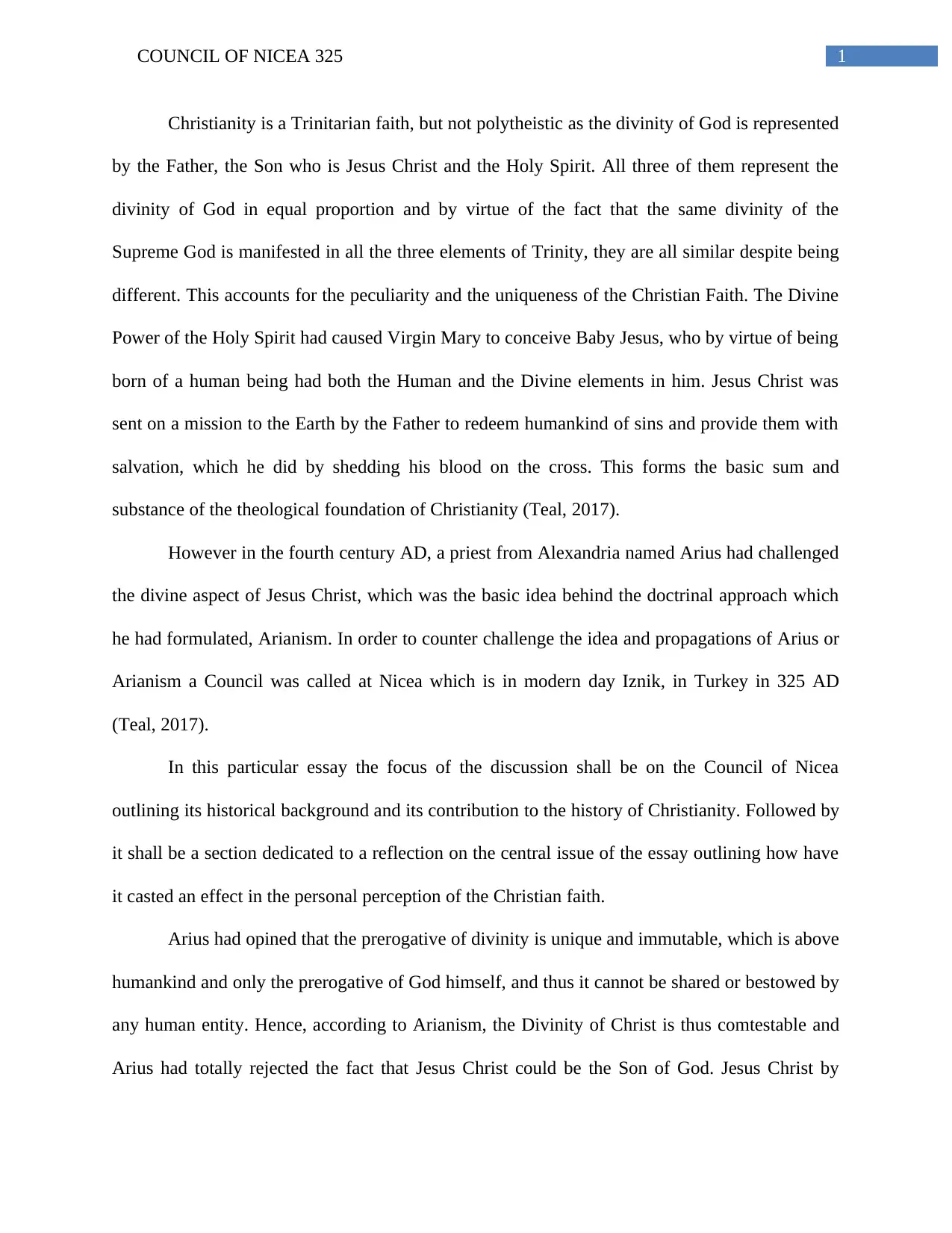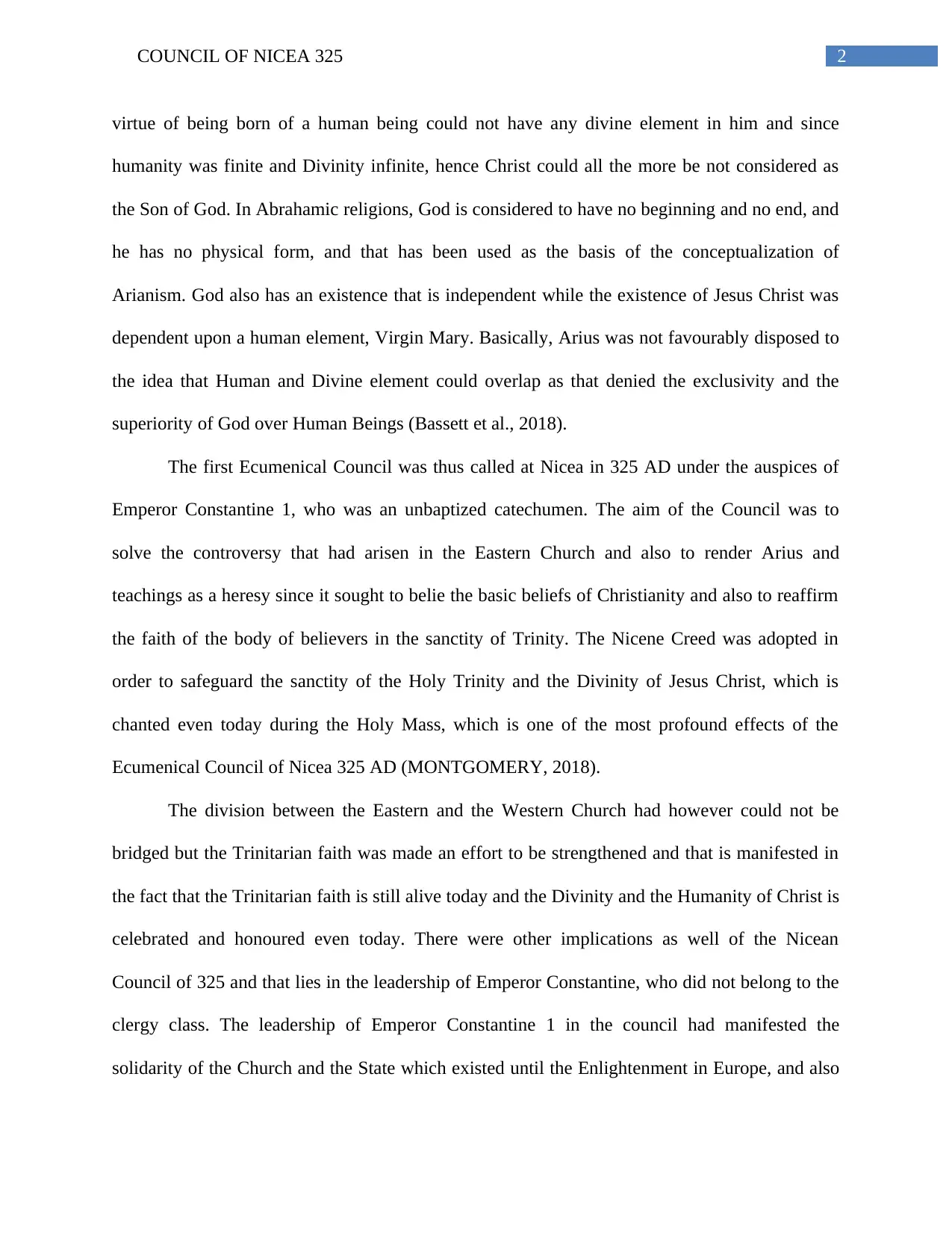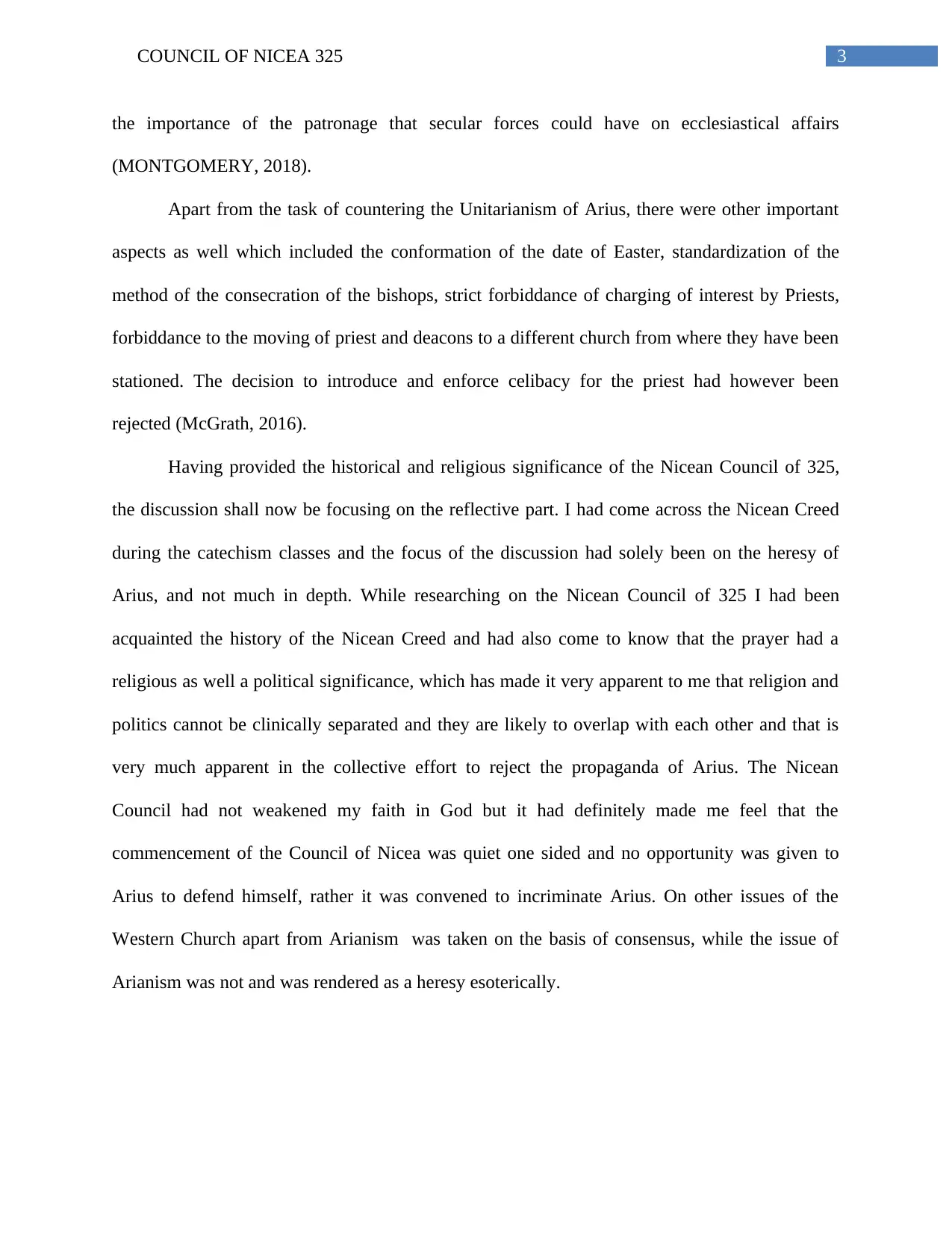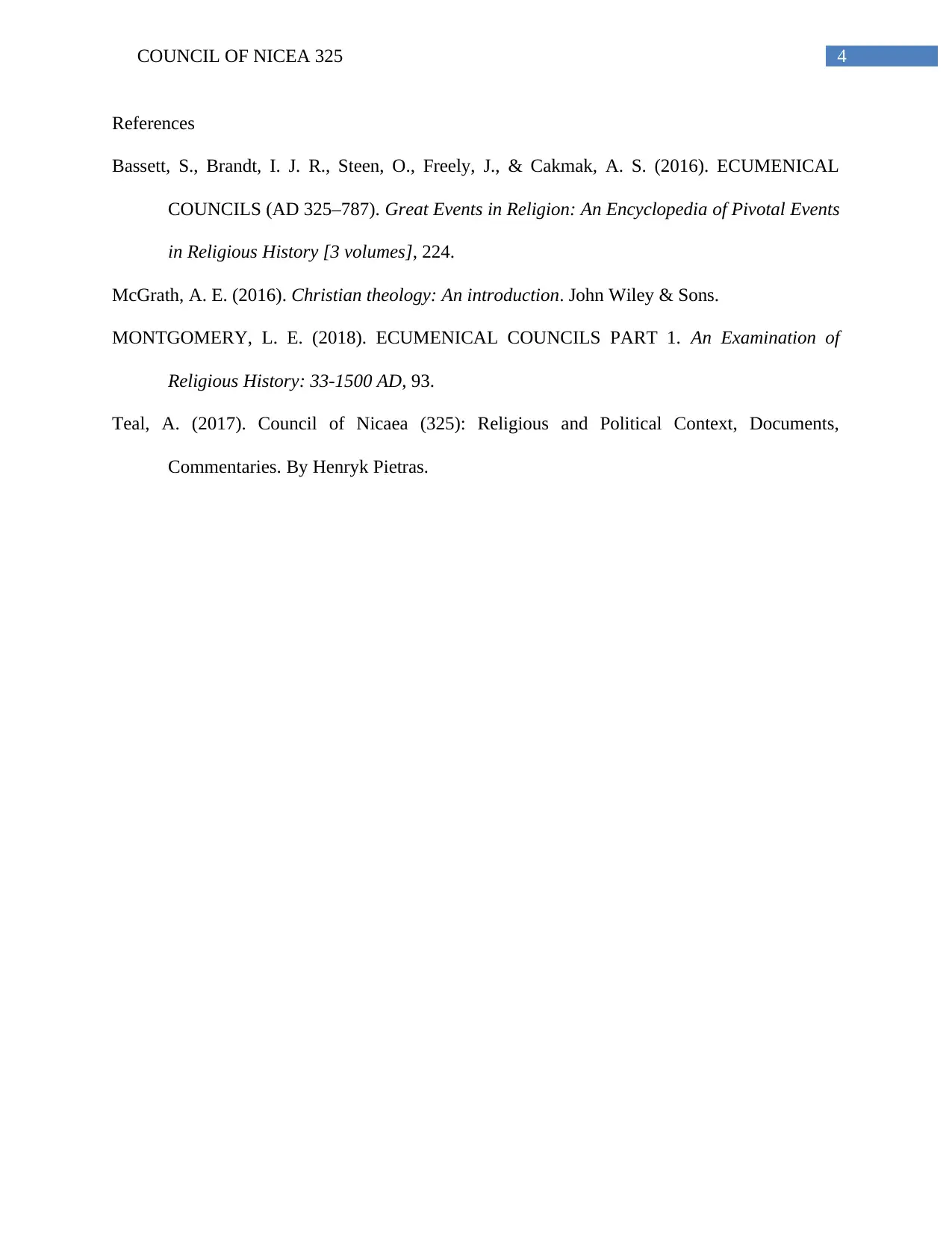The Council of Nicaea 325: Historical Context, Theology, and Impact
VerifiedAdded on 2022/09/22
|5
|1252
|18
Essay
AI Summary
This essay provides a comprehensive overview of the Council of Nicaea in 325 AD, examining its historical background, the theological challenges posed by Arianism, and the council's impact on the development of Christian doctrine. It outlines the context of the council, convened by Emperor Constantine I to address the controversy surrounding the divinity of Jesus Christ. The essay delves into the core tenets of Arianism, the formulation of the Nicene Creed, and the council's role in establishing the doctrine of the Holy Trinity. Furthermore, it explores the political implications of the council, including the relationship between the Church and the State. The essay also includes a reflective section, discussing the author's personal understanding of the Council of Nicaea and its influence on their faith. It highlights the significance of the council in shaping the core beliefs of Christianity and its lasting impact on religious and political spheres.

Running head: COUNCIL OF NICEA 325
COUNCIL OF NICEA 325
Name of the Student
Name of the University
Author Note
COUNCIL OF NICEA 325
Name of the Student
Name of the University
Author Note
Paraphrase This Document
Need a fresh take? Get an instant paraphrase of this document with our AI Paraphraser

1COUNCIL OF NICEA 325
Christianity is a Trinitarian faith, but not polytheistic as the divinity of God is represented
by the Father, the Son who is Jesus Christ and the Holy Spirit. All three of them represent the
divinity of God in equal proportion and by virtue of the fact that the same divinity of the
Supreme God is manifested in all the three elements of Trinity, they are all similar despite being
different. This accounts for the peculiarity and the uniqueness of the Christian Faith. The Divine
Power of the Holy Spirit had caused Virgin Mary to conceive Baby Jesus, who by virtue of being
born of a human being had both the Human and the Divine elements in him. Jesus Christ was
sent on a mission to the Earth by the Father to redeem humankind of sins and provide them with
salvation, which he did by shedding his blood on the cross. This forms the basic sum and
substance of the theological foundation of Christianity (Teal, 2017).
However in the fourth century AD, a priest from Alexandria named Arius had challenged
the divine aspect of Jesus Christ, which was the basic idea behind the doctrinal approach which
he had formulated, Arianism. In order to counter challenge the idea and propagations of Arius or
Arianism a Council was called at Nicea which is in modern day Iznik, in Turkey in 325 AD
(Teal, 2017).
In this particular essay the focus of the discussion shall be on the Council of Nicea
outlining its historical background and its contribution to the history of Christianity. Followed by
it shall be a section dedicated to a reflection on the central issue of the essay outlining how have
it casted an effect in the personal perception of the Christian faith.
Arius had opined that the prerogative of divinity is unique and immutable, which is above
humankind and only the prerogative of God himself, and thus it cannot be shared or bestowed by
any human entity. Hence, according to Arianism, the Divinity of Christ is thus comtestable and
Arius had totally rejected the fact that Jesus Christ could be the Son of God. Jesus Christ by
Christianity is a Trinitarian faith, but not polytheistic as the divinity of God is represented
by the Father, the Son who is Jesus Christ and the Holy Spirit. All three of them represent the
divinity of God in equal proportion and by virtue of the fact that the same divinity of the
Supreme God is manifested in all the three elements of Trinity, they are all similar despite being
different. This accounts for the peculiarity and the uniqueness of the Christian Faith. The Divine
Power of the Holy Spirit had caused Virgin Mary to conceive Baby Jesus, who by virtue of being
born of a human being had both the Human and the Divine elements in him. Jesus Christ was
sent on a mission to the Earth by the Father to redeem humankind of sins and provide them with
salvation, which he did by shedding his blood on the cross. This forms the basic sum and
substance of the theological foundation of Christianity (Teal, 2017).
However in the fourth century AD, a priest from Alexandria named Arius had challenged
the divine aspect of Jesus Christ, which was the basic idea behind the doctrinal approach which
he had formulated, Arianism. In order to counter challenge the idea and propagations of Arius or
Arianism a Council was called at Nicea which is in modern day Iznik, in Turkey in 325 AD
(Teal, 2017).
In this particular essay the focus of the discussion shall be on the Council of Nicea
outlining its historical background and its contribution to the history of Christianity. Followed by
it shall be a section dedicated to a reflection on the central issue of the essay outlining how have
it casted an effect in the personal perception of the Christian faith.
Arius had opined that the prerogative of divinity is unique and immutable, which is above
humankind and only the prerogative of God himself, and thus it cannot be shared or bestowed by
any human entity. Hence, according to Arianism, the Divinity of Christ is thus comtestable and
Arius had totally rejected the fact that Jesus Christ could be the Son of God. Jesus Christ by

2COUNCIL OF NICEA 325
virtue of being born of a human being could not have any divine element in him and since
humanity was finite and Divinity infinite, hence Christ could all the more be not considered as
the Son of God. In Abrahamic religions, God is considered to have no beginning and no end, and
he has no physical form, and that has been used as the basis of the conceptualization of
Arianism. God also has an existence that is independent while the existence of Jesus Christ was
dependent upon a human element, Virgin Mary. Basically, Arius was not favourably disposed to
the idea that Human and Divine element could overlap as that denied the exclusivity and the
superiority of God over Human Beings (Bassett et al., 2018).
The first Ecumenical Council was thus called at Nicea in 325 AD under the auspices of
Emperor Constantine 1, who was an unbaptized catechumen. The aim of the Council was to
solve the controversy that had arisen in the Eastern Church and also to render Arius and
teachings as a heresy since it sought to belie the basic beliefs of Christianity and also to reaffirm
the faith of the body of believers in the sanctity of Trinity. The Nicene Creed was adopted in
order to safeguard the sanctity of the Holy Trinity and the Divinity of Jesus Christ, which is
chanted even today during the Holy Mass, which is one of the most profound effects of the
Ecumenical Council of Nicea 325 AD (MONTGOMERY, 2018).
The division between the Eastern and the Western Church had however could not be
bridged but the Trinitarian faith was made an effort to be strengthened and that is manifested in
the fact that the Trinitarian faith is still alive today and the Divinity and the Humanity of Christ is
celebrated and honoured even today. There were other implications as well of the Nicean
Council of 325 and that lies in the leadership of Emperor Constantine, who did not belong to the
clergy class. The leadership of Emperor Constantine 1 in the council had manifested the
solidarity of the Church and the State which existed until the Enlightenment in Europe, and also
virtue of being born of a human being could not have any divine element in him and since
humanity was finite and Divinity infinite, hence Christ could all the more be not considered as
the Son of God. In Abrahamic religions, God is considered to have no beginning and no end, and
he has no physical form, and that has been used as the basis of the conceptualization of
Arianism. God also has an existence that is independent while the existence of Jesus Christ was
dependent upon a human element, Virgin Mary. Basically, Arius was not favourably disposed to
the idea that Human and Divine element could overlap as that denied the exclusivity and the
superiority of God over Human Beings (Bassett et al., 2018).
The first Ecumenical Council was thus called at Nicea in 325 AD under the auspices of
Emperor Constantine 1, who was an unbaptized catechumen. The aim of the Council was to
solve the controversy that had arisen in the Eastern Church and also to render Arius and
teachings as a heresy since it sought to belie the basic beliefs of Christianity and also to reaffirm
the faith of the body of believers in the sanctity of Trinity. The Nicene Creed was adopted in
order to safeguard the sanctity of the Holy Trinity and the Divinity of Jesus Christ, which is
chanted even today during the Holy Mass, which is one of the most profound effects of the
Ecumenical Council of Nicea 325 AD (MONTGOMERY, 2018).
The division between the Eastern and the Western Church had however could not be
bridged but the Trinitarian faith was made an effort to be strengthened and that is manifested in
the fact that the Trinitarian faith is still alive today and the Divinity and the Humanity of Christ is
celebrated and honoured even today. There were other implications as well of the Nicean
Council of 325 and that lies in the leadership of Emperor Constantine, who did not belong to the
clergy class. The leadership of Emperor Constantine 1 in the council had manifested the
solidarity of the Church and the State which existed until the Enlightenment in Europe, and also
⊘ This is a preview!⊘
Do you want full access?
Subscribe today to unlock all pages.

Trusted by 1+ million students worldwide

3COUNCIL OF NICEA 325
the importance of the patronage that secular forces could have on ecclesiastical affairs
(MONTGOMERY, 2018).
Apart from the task of countering the Unitarianism of Arius, there were other important
aspects as well which included the conformation of the date of Easter, standardization of the
method of the consecration of the bishops, strict forbiddance of charging of interest by Priests,
forbiddance to the moving of priest and deacons to a different church from where they have been
stationed. The decision to introduce and enforce celibacy for the priest had however been
rejected (McGrath, 2016).
Having provided the historical and religious significance of the Nicean Council of 325,
the discussion shall now be focusing on the reflective part. I had come across the Nicean Creed
during the catechism classes and the focus of the discussion had solely been on the heresy of
Arius, and not much in depth. While researching on the Nicean Council of 325 I had been
acquainted the history of the Nicean Creed and had also come to know that the prayer had a
religious as well a political significance, which has made it very apparent to me that religion and
politics cannot be clinically separated and they are likely to overlap with each other and that is
very much apparent in the collective effort to reject the propaganda of Arius. The Nicean
Council had not weakened my faith in God but it had definitely made me feel that the
commencement of the Council of Nicea was quiet one sided and no opportunity was given to
Arius to defend himself, rather it was convened to incriminate Arius. On other issues of the
Western Church apart from Arianism was taken on the basis of consensus, while the issue of
Arianism was not and was rendered as a heresy esoterically.
the importance of the patronage that secular forces could have on ecclesiastical affairs
(MONTGOMERY, 2018).
Apart from the task of countering the Unitarianism of Arius, there were other important
aspects as well which included the conformation of the date of Easter, standardization of the
method of the consecration of the bishops, strict forbiddance of charging of interest by Priests,
forbiddance to the moving of priest and deacons to a different church from where they have been
stationed. The decision to introduce and enforce celibacy for the priest had however been
rejected (McGrath, 2016).
Having provided the historical and religious significance of the Nicean Council of 325,
the discussion shall now be focusing on the reflective part. I had come across the Nicean Creed
during the catechism classes and the focus of the discussion had solely been on the heresy of
Arius, and not much in depth. While researching on the Nicean Council of 325 I had been
acquainted the history of the Nicean Creed and had also come to know that the prayer had a
religious as well a political significance, which has made it very apparent to me that religion and
politics cannot be clinically separated and they are likely to overlap with each other and that is
very much apparent in the collective effort to reject the propaganda of Arius. The Nicean
Council had not weakened my faith in God but it had definitely made me feel that the
commencement of the Council of Nicea was quiet one sided and no opportunity was given to
Arius to defend himself, rather it was convened to incriminate Arius. On other issues of the
Western Church apart from Arianism was taken on the basis of consensus, while the issue of
Arianism was not and was rendered as a heresy esoterically.
Paraphrase This Document
Need a fresh take? Get an instant paraphrase of this document with our AI Paraphraser

4COUNCIL OF NICEA 325
References
Bassett, S., Brandt, I. J. R., Steen, O., Freely, J., & Cakmak, A. S. (2016). ECUMENICAL
COUNCILS (AD 325–787). Great Events in Religion: An Encyclopedia of Pivotal Events
in Religious History [3 volumes], 224.
McGrath, A. E. (2016). Christian theology: An introduction. John Wiley & Sons.
MONTGOMERY, L. E. (2018). ECUMENICAL COUNCILS PART 1. An Examination of
Religious History: 33-1500 AD, 93.
Teal, A. (2017). Council of Nicaea (325): Religious and Political Context, Documents,
Commentaries. By Henryk Pietras.
References
Bassett, S., Brandt, I. J. R., Steen, O., Freely, J., & Cakmak, A. S. (2016). ECUMENICAL
COUNCILS (AD 325–787). Great Events in Religion: An Encyclopedia of Pivotal Events
in Religious History [3 volumes], 224.
McGrath, A. E. (2016). Christian theology: An introduction. John Wiley & Sons.
MONTGOMERY, L. E. (2018). ECUMENICAL COUNCILS PART 1. An Examination of
Religious History: 33-1500 AD, 93.
Teal, A. (2017). Council of Nicaea (325): Religious and Political Context, Documents,
Commentaries. By Henryk Pietras.
1 out of 5
Related Documents
Your All-in-One AI-Powered Toolkit for Academic Success.
+13062052269
info@desklib.com
Available 24*7 on WhatsApp / Email
![[object Object]](/_next/static/media/star-bottom.7253800d.svg)
Unlock your academic potential
Copyright © 2020–2026 A2Z Services. All Rights Reserved. Developed and managed by ZUCOL.





